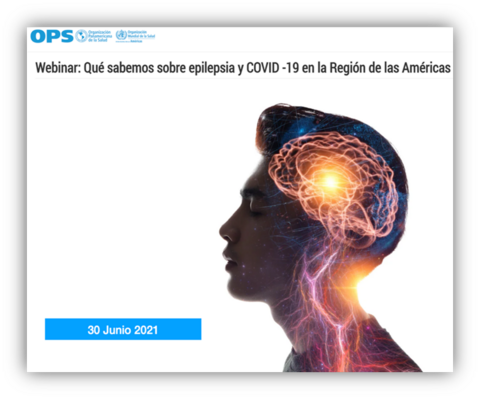Under the auspices of the Pan American Health Organization, a Webinar entitled "What we know about Epilepsy and COVID-19 in the Region of the Americas" was held in Washington D.C. on 30 June. Dr. Renato Oliveira e Souza, Chief of PAHO/WHO Mental Health and Substance Use Unit, delivered the opening remarks emphasizing that "this activity is part of PAHO's technical cooperation efforts to strengthen and improve care for people with epilepsy in the Region of the Americas, an issue that is being addressed in the context of a global pandemic that is severely affecting the whole world, which has undoubtedly had a strong impact on the supply and quality of health services for people with epilepsy".
Dr. Oliveira added: "But today, we are also pleased to see that epilepsy-related issues are increasingly gaining ground and being placed on the national health agendas of many countries. The Region of the Americas was the first at the global level to have a strategy and action plan on epilepsy (since 2011); and now we are contributing to the global debate, sharing our experience".
The high burden associated with epilepsy and other neurological disorders is linked to profound inequities. Nearly 80% of people with epilepsy live in low- and middle-income countries. Additionally, the treatment gap is more than 75% in low-income countries and 50% in middle-income countries.
During the Seminar, recognition was given to PAHO's two partner organizations in this endeavour, the International League Against Epilepsy (ILAE) and the International Bureau Against Epilepsy (IBE). Also invited were the directors of PAHO/WHO collaborating centers in Honduras and Chile, key players in the technical cooperation efforts with PAHO Member States.
The first speaker was young Michela Sofia Betanzo, from Chile, with a serious and difficult-to-manage epilepsy, who brought a very enlightening life testimony to the meeting, showing how, despite the harsh circumstances imposed by her health condition, it is possible to "Live to the full". She was undoubtedly the bearer of a message of hope.
The keynote speakers, Doctors Carlos Acevedo and Marco Tulio Medina, directors of the Chilean and Honduran Collaborating Centers, presented available scientific evidence and shared their experiences in the management of people with epilepsy during the pandemic, including neurological and other consequences of COVID 19. At the end of the event, Dr. Mario Alonso, President of the Latin American Region of ILAE and Director of the International Centre for Epilepsy Surgery, offered a synthesis and reflection on the issues discussed.
About 550 health workers and other stakeholders registered for the webinar, and 104 people logged on during the webcast. Finally, Dr. Claudina Cayetano, PAHO/WHO Regional Mental Health Advisor, who coordinated the event, expressed that it had been a good opportunity for participants to deepen their knowledge and exchange experiences and lessons learned in the field of epilepsy and COVID. Dr. Cayetano reiterated PAHO's willingness to continue collaborating with the countries of the Americas (governments and other partners) to address the enormous challenges that lie ahead.

